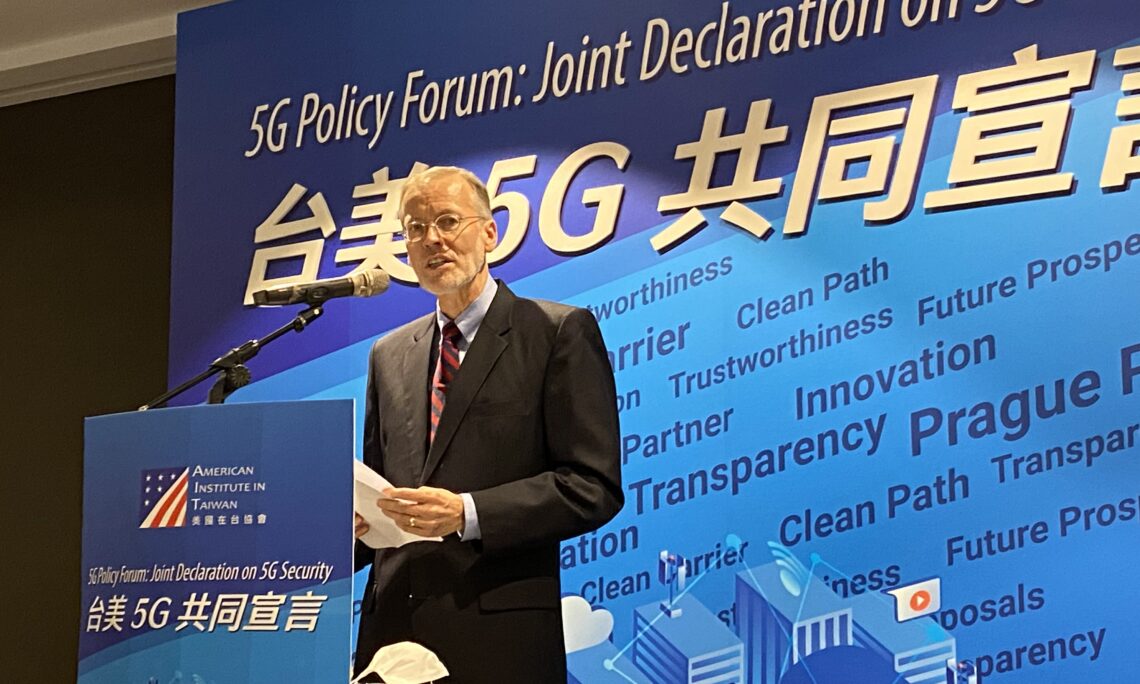OT-2032
August 26, 2020
Remarks by AIT Director W. Brent Christensen at
the Announcement of the AIT-TECRO Joint Declaration on 5G Security
Wednesday, August 26, 2020
(as prepared for delivery)
Minister Wu, NCC Chairperson Chen, Commissioner Sun, Legislator Liu, DG Jyan, distinguished panelists, honored guests, ladies and gentleman, Wu-An!
It is my distinct pleasure to be with you today to announce the AIT-TECRO Joint Declaration on 5G Security. We are proud to stand with Taiwan, a truly reliable partner, to publicly proclaim our shared values and close cooperation on 5G Security.
The United States advocates for a vibrant digital economy worldwide that benefits from the promise of fifth-generation (5G) networks. 5G is transformative and will touch every aspect of our lives, including critical infrastructure. Innovative new capabilities will power smart manufacturing, smart cities, autonomous vehicles, healthcare, and other groundbreaking technologies. Due to the way 5G networks are built, it is impossible to separate any one part of the network from another. With so much on the line, it is urgent that trustworthy companies build the information infrastructure for the 21st century.
In May 2019, government officials from more than 30 countries across the globe, alongside representatives from the European Union, the North Atlantic Treaty Organization, and industry, participated in discussions regarding the important national security, economic, and commercial considerations that must be part of each country’s evaluation of 5G vendors. The resulting Prague Proposals on 5G security published by the Czech conference chair serve as a set of recommendations and principles for nations to consider as they design, construct, and administer their 5G infrastructure. We welcome Taiwan’s endorsement of these important measures.
Let me be clear, the consequences of 5G deployment choices made now by governments and by telecom operators will be felt for years, if not decades, to come. Countries need to be able to trust the 5G equipment and software companies and know that they will not threaten their national security, privacy, intellectual property, or human rights. Trust cannot exist where telecom vendors are subject to authoritative governments like the People’s Republic of China, which lacks an independent judiciary or the rule of law, and whose limited privacy protections result in security vulnerabilities.
On April 29, 2020, Secretary Pompeo announced that the U.S. Department of State will begin requiring a Clean Path for all 5G network traffic entering and exiting U.S. diplomatic facilities. The 5G Clean Path is an end-to-end communication path that does not use any transmission, control, computing, or storage equipment from extremely problematic, untrusted IT vendors, such as Huawei and ZTE. The 5G Clean Path embodies the highest standards of security against untrusted, high-risk vendors’ ability to disrupt, manipulate or deny services to private citizens, financial institutions, or critical infrastructure. We are happy that Taiwan is a member of the 5G Clean Path Initiative.
Taiwan and the United States are joined by other “clean” partners with the aim of keeping technology systems clean and free of untrusted vendors to promote the security of nations by protecting sensitive data of our citizens and companies from authoritarian governments. This Clean Network, which is rooted in internationally recognized digital trust standards, will ensure that only trusted clean vendors are used in critical technologies. Here in Taiwan, all five local 5G telecom providers are considered by the U.S. Department of State to be Clean Carriers. This environment of trust should encourage cooperation between U.S. and Taiwan communication equipment and cybersecurity companies.
As the world continues to battle the COVID-19 pandemic and to adapt to the new normal, we have depended on digital technology and connectivity more than ever. The fact that we’re able to speak virtually and continue to get work done is due to the incredible phenomenal advances made in the information and communications technology space over the last decade. Everyone now realizes the importance of digital technology for telemedicine, education, and doing business. We all need to realize that information communications technology is, in fact, critical infrastructure and should be secured as such.
Today’s Joint Declaration says, “We believe that it is critical to transition from untrusted network hardware and software suppliers in existing networks to trusted ones through regular lifecycle replacements. Such efforts will not only improve our respective security, but also provide opportunities for private sector innovators to succeed under free and fair competition and benefit our respective digital economies.”
As you may know, this month we are celebrating U.S.-Taiwan Security Cooperation Month. When we talk about our security cooperation with Taiwan, most people think about arms sales. But the security challenges our societies face span both traditional and non-traditional threats, like natural disasters, disinformation, and cyber-attacks. Our shared values and commitment to facing the challenges and opportunities that new technologies present are exactly why we describe the US-Taiwan relationship as “Real Friends, Real Progress [真朋友真進展],” and I would like to take this opportunity to once again express the sincere appreciation of the United States for Taiwan’s support and friendship.”
We look forward to a fruitful panel discussion today.
Thank you.
















![Video Thumbnail [Recovered]-01](../wp-content/uploads/sites/269/Video-Thumbnail-Recovered-01-1-750x450.jpg)





